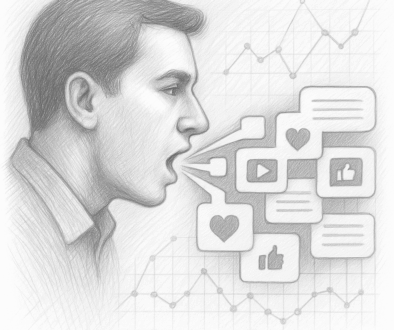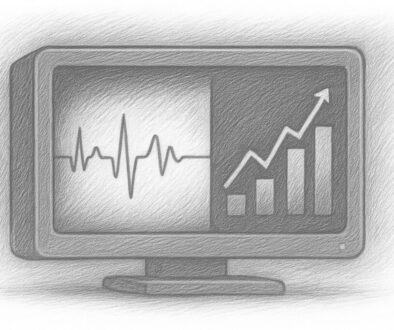Hey there, Business Hackers!
Welcome back to another edition of Business Hacks & Theories! We hope you enjoyed our last issue, “Decoding the Cognitive Biases Hijacking Your Business Brain.”It was all about those sneaky little biases that can throw a wrench in your decision-making process. This time, we’re diving into something just as crucial:
how various industries are profiting off the increasing rates of depression in society.
Buckle up because we’re about to uncover some eye-opening truths!
What’s Inside This Issue?
Pharmaceutical Profits How Big Pharma markets antidepressants.
The Self-Help Boom The rise and controversies of the self-help industry.
Wellness Wonders or Blunders? Dietary supplements and their shaky scientific backing.
Tech and Therapy The digital age of mental health apps and online therapy.
Media Madness How movies, TV, and ads shape our mental health perceptions.
Social Media Traps The cycle of FOMO and targeted advertising.
Let’s Get Into It!
Pharmaceutical Profits: Big Pharma’s Big Wins
Alright, let’s kick things off with the pharmaceutical industry. Remember Prozac? Launched in 1987 by Eli Lilly, it was the first SSRI and revolutionized how we treat depression. Their marketing was genius, using emotive “before and after” images that painted a picture of transformation from sadness to joy. These ads appeared everywhere, from Family Circle to Good Housekeeping, helping Prozac become a billion-dollar blockbuster.
But here’s the kicker: many clinical trials for antidepressants have been criticized for being biased. Companies often highlight positive results while downplaying the negatives, giving us a skewed view of these drugs’ effectiveness and safety.

The Self-Help Boom: From Bestsellers to Bizarre
Now, let’s talk about the self-help industry—a billion-dollar behemoth. It’s all about selling books, courses, and seminars promising to change your life. Take James Arthur Ray, for instance. Known for his role in “The Secret,” he hosted a retreat that tragically resulted in three deaths. Or consider Napoleon Hill, whose book “Think and Grow Rich” sold millions despite allegations of fraud.
Then there’s Tony Robbins, the high-energy guru famous for his intense seminars. Critics argue that his methods can be emotionally manipulative, exploiting vulnerable people desperate for change. And don’t forget Jay Shetty, the former monk turned life coach, accused of plagiarizing content. Despite the controversies, these figures continue to thrive, selling hope in various formats.

Wellness Wonders or Blunders?: The Supplement Saga
The wellness market is booming with products like Raspberry Ketone and Ginkgo Biloba, marketed with grand promises but little scientific backing. These supplements claim to improve everything from memory to weight loss, but studies often don’t support these claims. For example, St. John’s Wort is touted for depression but can dangerously interact with other medications.
Raspberry Ketone is often promoted as a miracle weight loss supplement, but the science is not on its side. Most studies supporting its efficacy are either conducted on animals or are too limited to be conclusive. Yet, marketing tactics include celebrity endorsements and dramatic before-and-after photos to lure in desperate consumers (Mayo Clinic).
Ginkgo Biloba is sold as a memory enhancer. Despite its popularity, extensive research shows minimal benefit. Companies market this supplement using imagery of vibrant elderly individuals and claims of cognitive rejuvenation, tapping into the fears of aging and cognitive decline (Penn Medicine).
St. John’s Wort is another popular supplement, especially in Europe, for treating mild to moderate depression. However, its interaction with other medications can be dangerous.
Marketing often emphasizes its “natural” aspect, appealing to those wary of pharmaceuticals, but neglects to mention potential risks (Penn Medicine).
Melatonin is widely used for sleep disorders. While it may help with jet lag or shift work sleep disorder, its effectiveness for general insomnia is debatable. Nonetheless, ads depict peaceful sleep and stress-free mornings, appealing to the sleep-deprived masses (Penn Medicine).
Echinacea is marketed as a remedy for the common cold, yet scientific studies provide inconsistent results. Its appeal lies in its “natural” label and the promise of fewer sick days, capitalized on through catchy slogans and health influencer endorsements (Science-Based Medicine).

Tech and Therapy: Digital Dilemmas
In the digital age, mental health apps like Calm and Headspace are all the rage. They offer meditation and mindfulness practices, promising relief from anxiety and depression. These apps have turned into billion-dollar businesses, leveraging emotional success stories and celebrity endorsements to attract users.
Calm, for instance, uses serene visuals and soothing voices from celebrities to promote its premium services. They promise a journey to a stress-free life, often ignoring that meditation alone might not suffice for serious mental health issues.
Similarly, Headspace markets itself with colorful animations and friendly tones, suggesting that a few minutes a day can significantly improve mental health. While these apps can be beneficial, they can also create unrealistic expectations about the ease and speed of mental health improvements.
Online therapy platforms like BetterHelp and Talkspace advertise themselves as convenient solutions for mental health issues. They promise therapy at your fingertips, often at lower costs than traditional therapy. However, the quality of care can vary, and these platforms have faced scrutiny over privacy concerns and the qualifications of their therapists.
Media Madness: Influencing Perceptions
Movies and TV shows often dramatize mental health issues, sometimes inaccurately. For instance, many shows and films dramatize mental health issues, influencing public perception but also perpetuating stereotypes. These portrayals boost viewership and profits but can negatively impact how society views mental illness.
For example, a popular show might depict a character with depression in a way that oversimplifies or glamorizes their struggles, potentially misleading viewers about the reality of living with such conditions. These dramatizations can create a skewed understanding of mental health, leading to stigma and misinformation (Resources To Recover).
Advertisements also play a significant role in shaping perceptions. For instance, beauty and fashion ads often feature models with perfect bodies, setting unrealistic standards. Brands like Victoria’s Secret use digitally altered images to sell their products, which can contribute to self-esteem issues and depression among consumers. These ads suggest that buying their products will lead to happiness and social acceptance, exploiting insecurities for profit (Verywell Mind).

Social Media Traps: The FOMO Cycle
Social media platforms like Instagram, Facebook, and TikTok are designed to keep users engaged as long as possible. They create a cycle of dependency, where users are continuously exposed to content that evokes envy and FOMO (Fear of Missing Out). This can worsen depressive symptoms, as users constantly compare their lives to the seemingly perfect ones they see online.
Instagram, for example, uses algorithms to show users posts that are likely to generate engagement, often highlighting content that triggers strong emotional responses. This can lead to a distorted view of reality, where users believe everyone else is happier and more successful (Verywell Mind) (Child Mind Institute).
Facebook employs similar tactics, with notifications and targeted content that draw users back to the platform. These strategies increase the time users spend online, exposing them to more ads. These ads are highly targeted, using data on users’ emotional states and behaviors to push products that promise to improve mental health. This can exploit users’ vulnerabilities, encouraging them to buy products they might not need (Mudita Products) (Frontiers).
Wrapping Up
The way depression and mental health struggles are exploited across various industries is both complex and concerning. From pharmaceutical companies to the booming self-help market, the drive for profit often overshadows genuine care for individuals’ well-being.
Pharmaceutical Companies: These giants leverage extensive marketing campaigns and selective clinical trials to promote antidepressants. The portrayal of a quick fix through medication often hides the nuanced reality of treating mental health conditions, sometimes leading to dependency or overlooking alternative therapies.
Self-Help Industry: This sector thrives on promises of personal transformation and quick fixes. High-profile figures like James Arthur Ray, Napoleon Hill, Tony Robbins, and Jay Shetty have built empires by selling hope. However, the controversies and tragic outcomes associated with some of their methods highlight the need for a critical approach to self-help solutions.
Wellness Products: The supplement industry taps into the desire for natural remedies but often markets products with dubious scientific backing. The emphasis on naturalness and quick benefits can lead consumers to overlook potential risks and side effects.
Digital Mental Health Solutions: Apps and online therapy platforms offer accessibility and convenience but come with their own set of challenges. While they can be beneficial, they sometimes create unrealistic expectations about mental health improvements and raise concerns about privacy and the quality of care.
Media and Advertising: Movies, TV shows, and advertisements shape our perceptions of mental health, often in ways that are not accurate or helpful. They can perpetuate stereotypes and unrealistic standards, contributing to stigma and misinformed public opinions.
Social Media: Platforms like Instagram and Facebook exploit emotional vulnerabilities through targeted advertising and algorithms designed to keep users engaged. This can exacerbate feelings of inadequacy and depression, creating a cycle of dependency and constant comparison.
As consumers, it’s crucial to approach these products and services with a critical eye. Awareness and education are key to navigating the complex landscape of mental health marketing. By understanding these dynamics, we can make more informed choices and advocate for ethical practices in how mental health is portrayed and treated.
Stay savvy, and see you in the next issue!
Sources
- Verywell Mind – Stigma and Mental Health in Media
- AAP Publications – Digital Media, Anxiety, and Depression in Children
- Cambridge Core – Digital health technologies and major depressive disorder
- Science-Based Medicine – Supplements: Still popular despite little evidence they’re useful
- Penn Medicine – The Truth About Supplements: 5 Things You Should Know
- Mayo Clinic – Dietary supplements for weight loss
- HealthyPlace – The Financial Exploitation of Mental Health
- Psychology Today – How to Escape the Toxic World of Unhelpful Self-Help
- Mad in America – Hijacking Clinical Trials for Marketing Purposes
- BNN Breaking – Jay Shetty’s Controversial Rise
- CNBC – Calm App Valuation
- Forbes – The Billion Dollar Self-Help Industry
- BBC – Tony Robbins’ Controversies



